- Home
- Michael Leese
I Can See You
I Can See You Read online
I Can See You
A gripping murder thriller set in modern-day London
Michael Leese
A note from the author.
I Can See You is the second book in an unputdownable series of standalone stories featuring Jonathan Roper and Brian Hooley. The pair are Scotland Yard’s secret weapon in the fight against crime and terror - but they couldn’t be more different. Roper is young, gifted and autistic, and his idea of social interaction is telling people what they’ve got wrong. Hooley is the veteran copper who has seen and done it all. His idea of social interaction involves a punch in the mouth followed by a pint. It’s a potent mix and offers a roller coaster ride that will leave you gasping for breath or laughing out loud.
This book is written in British English.
I’d like to invite you to visit www.michael-leese.com to sign-up for my VIP readers list, to hear about new releases, free book promotions, special offers and exclusive extras.
As a Brit I’d recommend you settle down with a nice cup of tea and enjoy what is far more than just another cop story. You may have your own ideas on the perfect liquid accompaniment…
© Michael Leese
Maidstone, Kent
Details, details, details; it was always about the details. Tom Bennett had thought he was a master of details: now he knew better. The thought had been hammered home as he sat in this strange room. Everything was painted a brilliant white, the colour dazzling in the harsh light produced by the industrial sized, clear-glass bulb hanging from the centre of the ceiling. It was directly overhead, throwing out waves of heat he could feel on his face, head and hands. Just a few moments ago Bennett had been unable to stop himself looking at it. Strange shapes were still dancing around his retinas.
The man who’d brought him here had introduced himself as Mr. Roberts, no first name. He was dressed as though he were on the way to a board meeting. A dark-blue, pin-striped suit, white shirt and pale-pink tie, with chunky gold cufflinks on display. It was his eyes that struck you. They were a bright, almost electric blue. When those eyes turned on him he felt as though all his secrets were being stripped away. There was nothing he could hide from this man.
He had rapidly discovered that Mr. Roberts did know all about him. He knew the medication he was on for blood pressure; he knew that the doctor had recently agreed to prescribe a drug to help him get an erection; he even knew that his wife wished he had never been given it since her own sex drive had faded after giving birth to their second child.
As Mr. Roberts had talked so Bennett could see his life reduced to a series of cold facts. His height, five feet and eighth inches; his shoe size, left-foot size seven, right-foot size seven-and-a-half; his weight, thirteen stones and ten pounds; how many fillings he had, five; how much he’d told the doctor he drank, twenty-one units a week, and how much he really drank, 25 units so far, this week, 30 units the week before. He even knew how often he got up in the night to use the toilet.
On and on it had streamed. At first, he had been puzzled, then alarmed as the story of his life was put on display. How many underpants he had, twelve apparently; what his inside leg measured, twenty-seven inches; the prescription he needed to correct his short sight. By the time Mr. Roberts had worked his way round to his finances he had accepted there was no point in denying anything. Being presented with the details of his Swiss bank account - he thought no one knew about that - turned him into a true believer. Now he was beginning to think of Mr. Roberts as part mentor, part inquisitor and part shaman.
Bennett was a small man, a bit weedy, with thinning hair and glasses that never sat properly. He had numerous physical tics; scratching at his head, arms, face, neck and shoulders. Colleagues said you could gauge the state of his mind by the rate of his movements. Slow for relaxed; fast when firing on all cylinders. Right now, he was showing none of those signs. Instead he was listening attentively to Mr. Roberts’s voice. He found his deep voice compelling. He would probably do anything that voice told him.
Something was wrong - he had missed his cue to respond to a question. What was it? Ah, yes, now he had it. Mr. Roberts had just explained how careful observation told you everything you needed to know about a person. That had explained how he had known to be waiting on the common yesterday morning - and it was only yesterday.
Mr. Roberts wanted to know that he had understood. He went to nod his head but he couldn’t move. He was bound so tightly with masking tape that even breathing was hard, although he had been rewarded for ‘good behaviour’ by being given a slightly bigger breathing hole around his nose and mouth. He looked at his captor and managed a hoarse ‘yes’.
The answer seemed to please Mr. Roberts because he sat back in his chair and gave Bennett a nod. He even lent forward to pat his right hand, before reaching into his jacket and producing two aluminium knitting needles. They were the larger variety, ten millimetres in diameter. Mr. Roberts stood up and walked round the table so that he could carefully cut a small hole in the tape around both ears. Satisfied with his work he partially inserted the needles until they were pressed up against the ear drums.
All Bennett could focus on was the contrast between the radiated heat from the bulb burning the top of his head, and the cold sensation of the knitting needles in his ears. Those blue eyes locked on his. He stopped breathing. Mr. Roberts smiled and slammed each needle deep into his victim’s brain. Bennett couldn’t even manage a scream before his body thrashed against the restraints. He was dead instantly.
Mr. Roberts watched impassively as he waited for the corpse to complete its death dance. Once the body was quite still he produced a surgical scalpel from his jacket and placed it on the table. Unwrapping the head, he picked up the blade, worked it into the skin behind the left ear, and skillfully filleted the dead man’s face. Finished, he held it up for inspection. He liked the way the light from the bulb shone through the gaps for the eyes and the mouth. As soon as it had dried out a little he would try it on for size. Perhaps this one would work.
chapter 1
It wasn’t how he’d expected it to be. So far, he’d spotted several Star Wars, an Avengers and a couple of t-shirts bearing the names of what he presumed were rock bands; just none he recognised. The casual dress, and it didn’t apply to everyone, did nothing to disguise the intensity. Everyone at GCHQ seemed to be in a hurry to get where they were headed and he noted that few were saying hello to their colleagues.
Just getting in had been complex, but this was Britain’s super-sensitive listening post in Gloucestershire, where thousands of analysts worked at deciphering information snatched from the digital world. The Doughnut, as it was universally known, had its own restaurants staffed by waiters and waitresses who’d been security vetted, shops with assistant’s subject to background checks and even the Cappuccino was made by baristas given personal clearance to get past the gate-guards provided by a special contingent of MoD police.
All this was new to Brian Hooley, a veteran Detective Chief Inspector with Scotland Yard’s Special Investigation Unit. He had been driven down from London after receiving an urgent summons. He hadn’t even had time to tell his boss. He was told there was a car waiting outside, they wanted him to hurry. Within minutes he was in the back of a black Jaguar saloon heading out to Hammersmith and then the M4, past Heathrow, and picking up the ever-crowded M5. The driver, a rugged looking man with a military style close-cropped hair cut and dressed in a dark-grey suit, white shirt and no tie, told him roadworks elsewhere made this the only route.
He settled back in the rear seat, glancing in the rear-view mirror to check his hair; he thought his recent trip to the barber had highlighted how grey he was becoming. It didn’t feel that long ago when it was mostly dark. Studying the reflection of his eyes h
e noticed his crows’ feet were more prominent than ever. He looked away, the rest of him was in decent shape, he’d even managed to recently shrink his stomach a little. Not bad for an ‘ordinary middle-aged bloke’ suddenly jettisoned from settled family life to the dubious pleasures of bachelorhood.
As they sped out of London he tried to keep his mind clear. It was pointless to speculate about this summons. In his limited experience of getting close to the security services it could feel like being at the centre of a whirlwind. A short while later, and to his immense surprise, he was woken from a dreamless sleep when a young woman opened the rear door, giving him an appraising look in the process: he had the unsettling impression she was less than impressed. He climbed out, thanked the driver and attempted to surreptitiously wipe his mouth in case he had been drooling. On the day of his departing home, many barbs were thrown his way, including the accusation that he slobbered worse than the dog when taking a nap on the sofa.
His greeter had a pale face, made paler by her jet-black hair and her choice of glasses; they were thick-framed, black and too big for her long face. The look reminded him of someone but he couldn’t place it. She handed him a security pass with his picture on it, which got him through one set of barriers and she pointed him at a scanner to have his retinas checked against a data base. As he waited he recalled that the original imprint had been taken at around the time Jonathan Roper was transferred out of the Special Investigations Unit. This was the first time it had been put to the test.
As the lights turned green his companion took off into the building. He barely had time to take in his surroundings before they were rushing along a brightly lit corridor which seemed to cover the length of the building.
As he trotted to keep up, he heard her speak for the first time as she turned and told him he was being taken to meet the “neurodivergence” team. She made a fast right off the corridor and into a more dimly lit aisle of different sized cubicles with people working away. She stopped at a larger cubicle and indicated with a nod of her head that they had arrived. She took off, paying him no more attention. He was finding the initial experience slightly unnerving but as he stepped into the space he was immediately reassured to see the sole occupant was also wearing a shirt and tie.
“I was beginning to feel a little over-dressed,” said Hooley, as he made a gesture that took in his dark grey suit and blue shirt with navy-blue tie. The DCI wasn’t a fan of suits but had learned early in his career that it made life easier to wear one. To that end he owned four suits, two dark-grey and two dark-blue, and a couple of decent jackets to be worn with black trousers.
To Hooley’s relief the man laughed, making him look very young as he did so. The DCI guessed he was probably the same age as the woman: which also made him the same age as Jonathan Roper. He wondered if he was going to be the oldest person in the building. He was also assuming it was because of Roper that he was here today. His former colleague had been working at the spy-centre for the past six months, his work as a police analyst earning him wide-spread praise.
Roper’s talent had blossomed during a complex and highly sensitive case the pair had worked on in the previous year. While the credit for bringing a brutal gang to justice had rightly gone to Roper, it had emerged that Hooley had played a vital role. Roper had a form of autism that made it difficult for him to make friends. In fact, quite the reverse. But with Hooley’s support he had worked wonders.
The DCI decided to take the initiative. Holding out his hand he said, “Brian Hooley, I got the call to get my arse down here and I’m guessing that it’s to do with Jonathan?”
The other man accepted the outstretched hand with a firm grip of his own.
“Good to meet you Brian, and thanks for getting down here so quickly. I’m David Cotter, part of the neuro-diversity team here - and you’re right about Roper. My boss, Helen Sharples, had wanted to meet you but she’s been called off to something, so you’ve got me.” He pointed at a couple of sofa-style chairs. “They’re pretty comfortable so grab a seat, but first, can I get you anything to drink?”
Hooley shook his head. He was trying to cut down on his fluids since he spent a lot of time getting up in the night urgently needing to empty his bladder. What he would never admit was that he liked to keep something back to allow for alcohol, although nowadays that tended to be a couple of glasses of wine or a pint or two of lager. As they sat down Cotter leaned forward, his expression earnest.
“Please indulge me as I give you a little context. Here at GCHQ we employ a lot of people with far from conventional thinking, dyslexia and autism to name a couple. They are the reason why we came up with the “neurodiversity” programme. Basically, a systematic way of saying people are different and need different things to allow them to work effectively.”
He paused and then that smile appeared again. “Forgive me. You don’t need to be a body language expert to see that you are not entirely happy with the way this conversation is going. Let me assure you that I am not about to produce lots of acronyms to explain some behavioural theory.”
Realising he was making things worse, Cotter quickly added, “I’ll cut to the point. We’ve been working with Jonathan since he got here and devised a programme to make him feel secure and able to perform to do his best work.
“Once we identified him as being a potential benefit, it was decided to make the system work for Roper, not the other way around. He has a unique position here because he almost works off-grid. He chooses what he wants to focus on from an initial information dump provided by us.”
He glanced up at Hooley. “I don’t know if you’re a football man, but he’s like the really skillful one who scores goals and doesn’t have to worry about tackling. The problem is we haven’t done a great coaching job because he has been struggling recently.
“I’ve been working closely with him to see what extra we can do and in the last few days something occurred to me that I hadn’t considered because it so rarely applies to people like Roper. I think he’s missing company: specifically, there is something about his relationship with you that allows him to do his best work. Something we haven’t been able to replicate here at GCHQ.”
Hooley was genuinely taken-aback. He was having trouble with the concept of Roper needing his company, but also secretly pleased. He was one of the few people at Scotland Yard who had backed him when his idiosyncratic behaviour intruded on to his colleagues; in some cases, generating ill-feeling.
To Hooley’s surprise Cotter jumped to his feet. “Would you mind if I took you to meet him now? I think just watching how he acts when he sees you will confirm, or disprove, my theory.”
chapter 2
David Cotter quickly opened up a gap as he surged ahead, leaving Hooley to think that a couple of weeks here would make him fitter. They were back in the main corridor, before reaching an area where the cubicles were separated from each other by dividers about five feet high. Cotter had stopped a few yards ahead and was waiting for Hooley to catch-up. The DCI arrived and turned to see Ropers’s familiar face sitting at one of a pair of facing desks. His former colleague was working with two large screens directly in front of him and another large screen fixed at right angles to give both desks the ability to see what was running; in this case a French rolling news programme.
Thus far it was, to Hooley’s eye, all very high-tech and very Roper, but then realised what was wrong with this scene. Roper was not wearing what amounted to his uniform - and protective armour against the world - his skinny-fit black suit, white shirt and narrow black tie. At Scotland Yard he had never seen him wearing anything else. Here he was sporting what even Hooley would describe as a middle-aged combo of trousers and button-down shirt.
What hadn’t changed was his posture, sitting in the characteristic hunched position he favoured as he stared at his monitors. Seeing him like that always made Hooley wince as he thought of the strain it would put on his own back. He waited patiently for Roper to make some sort of acknowledgement th
at he was standing there. Eventually, he did look up from whatever had been holding his attention; his brown eyes flicking around the room before coming to rest on the DCI. “Oh, hello Brian.” His tone was neutral and there was no hint of a welcoming smile; he looked back at the screens and was instantly enveloped in a cloud of concentration.
Hooley felt a sense of dislocation. Roper was famously undemonstrative but given this was the first time they had met in months - he would doubtless know how long down to the very second - surely a little enthusiasm was called for? Instead his former colleague seemed to be ignoring him, and he wasn’t sure how to deal with it.
After what felt like a long moment of foot-shuffling uncertainty, at least as far as Hooley was concerned, Cotter broke the silence. “It looks like I was right.” Before a puzzled DCI could ask him anything he sped off, if anything moving even faster than before.
The DCI was unsure what to do next, and decided that if Roper was going to carry on ignoring him he might as well make himself comfortable by sitting down at the empty desk: at least he could take the weight off his feet while he tried to work out why he had been rushed down here.
He was easing himself into the seat when Roper spoke. “I’d say you’ve lost about eight pounds since I last saw you. I’m glad you’ve decided to do something about being so fat.” He hadn’t looked away from his screens.
“It’s eight-and-a-half pounds actually,” responded Hooley, feeling a hot rush of anger. “And thanks very much for taking an interest.” He might have tried injecting a note of sarcasm but knew that was pointless. The last time he had met up with Roper after a lengthy absence, the analyst had also told him he was overweight: no change there.

 (Jonathan Roper Investigates Boxset
(Jonathan Roper Investigates Boxset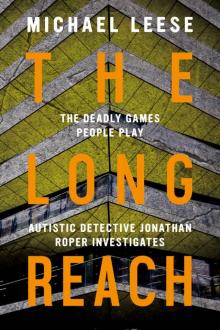 The Long Reach: British Detective (Jonathan Roper Investigates Book 3)
The Long Reach: British Detective (Jonathan Roper Investigates Book 3)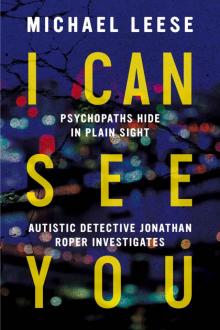 I Can See You
I Can See You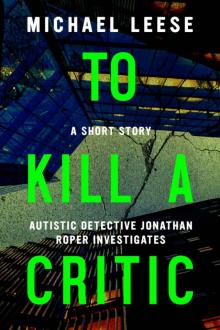 To Kill A Critic
To Kill A Critic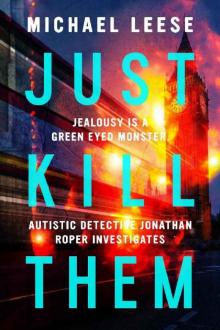 Just Kill Them
Just Kill Them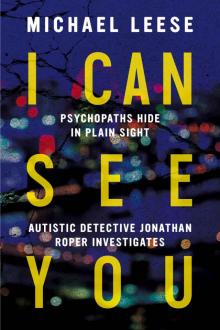 I Can See You: Autistic British Detective: Jonathan Roper Investigates Book 2
I Can See You: Autistic British Detective: Jonathan Roper Investigates Book 2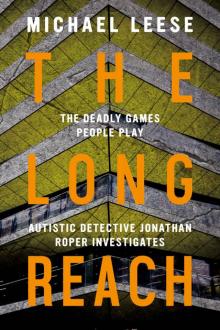 The Long Reach_British Detective
The Long Reach_British Detective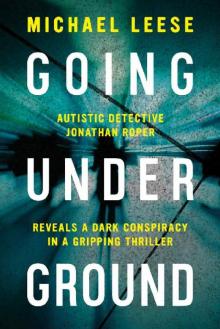 Going Underground (Jonathan Roper Investigates Book 1)
Going Underground (Jonathan Roper Investigates Book 1)